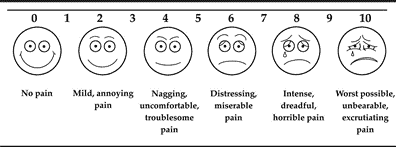The Visual Analogue Scale (VAS)
Have you ever wondered why your physio asks you to rate your pain levels? Here is why!
Pain is one of the most common symptoms reported by patients seeking physiotherapy. Pain can be acute or chronic, and it can affect a patient’s quality of life, athletic performance, ability to perform activities of daily living, and even their emotional state. To assess and monitor your pain, physiotherapists will often use the Visual Analogue Scale (VAS) to help understand your pain levels.
The VAS is a simple and reliable tool where the patient rates their pain from zero (no pain) to 10 (worst pain imaginable). It provides an objective measure of pain intensity that is easily understood by patients and allows physiotherapists to track the effectiveness of treatment over time.

Here are three reasons why gauging pain levels are important for physiotherapists:
- Accurate pain assessment: Pain is a subjective experience, and you may have difficulty describing your pain in words. The VAS provides a clear and simple method for you to rate their your pain levels accurately. This allows your physiotherapist to assess the your pain levels more objectively, monitor the progress of interventions, and adjust their treatment plan accordingly.
- Treatment planning: Understanding your pain level is essential in developing a treatment plan that is appropriate and specific to you. For example, if you report a high level of pain, your physiotherapist may choose to incorporate pain management techniques into their treatment plan, such as manual therapy, soft tissue therapy, or exercise. By tracking a your pain level with the VAS, your physiotherapist can also assess the effectiveness of different treatment techniques to make sure they are providing the most effective treatment.
- Communication: Pain is a complex and personal experience, and it is essential for physiotherapists to establish good communication with their patients. The VAS scale helps you communicate your pain levels more effectively, and it helps your physiotherapist understand your pain experiences better. This information will help physiotherapist to develop individualised treatment plans, monitor your progress and provide emotional support.
In conclusion, pain assessment is a crucial aspect of a physiotherapy session, and VAS pain levels are an essential tool for physiotherapists. By accurately assessing your pain level, your physiotherapist can develop individualised treatment plans that addresses your specific presentation.
References:
- Boonstra, A. M., Schiphorst Preuper, H. R., Reneman, M. F., Posthumus, J. B., & Stewart, R. E. (2008). Reliability and validity of the visual analogue scale for disability in patients with chronic musculoskeletal pain. International journal of rehabilitation research. Internationale Zeitschrift fur Rehabilitationsforschung. Revue internationale de recherches de readaptation, 31(2), 165–169. https://doi.org/10.1097/MRR.0b013e3282fc0f93
